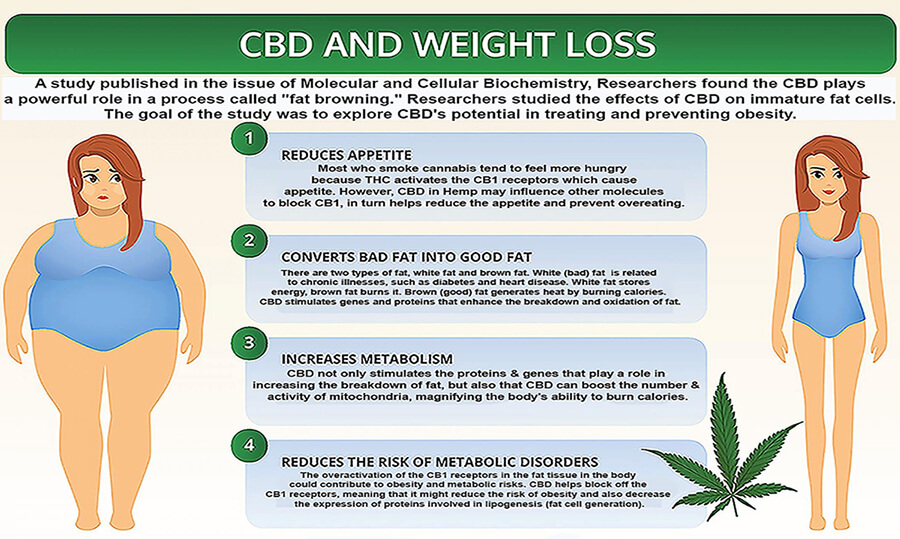Can CBD affect metabolism?
Cannabinoids, along with other compounds present in cannabis plants, have received a lot of attention in recent years. One aspect that has aroused great interest among researchers, consumers and the general public is the effect of cannabinoids on human metabolism. After all, one of the most famous cannabinoids, THC, produces very obvious metabolic effects, such as increased appetite, but what about CBD? Does it also affect our metabolism? Keep reading to find out.
How CBD affect metabolism?

Perhaps many people will ask, what is the difference between white adipose tissue and brown adipose tissue?
White fat is responsible for storing and supplying energy. It’s usually under our skin and around the organs. When white fat accumulates in excess, people are more likely to suffer from a variety of chronic diseases such as diabetes and heart disease. Brown fat is responsible for burning calories and can speed up our metabolism.
The study found that CBD has three main effects on fatstocks:
- Stimulates genes and proteins that help break down and oxidize fats.
- Increases the number and activity of mitochondria (which increases the body’s ability to burn calories).
- Reduces the expression of proteins involved in lipogenesis (formation of fat cells).
Taken together, these results are the result of CBD’s ability to induce “fat darkening” or to energy-efficiently convert white fat WAT into energy-burning brown fat BAT.
What is the relationship between the endocannabinoid system and metabolism?
CBD is able to interact with the body primarily through the endocannabinoid system (ECS). This system consists of endocannabinoids, receptors (in the nervous system and throughout the body) and metabolic enzymes and has been shown to be involved in many physiological processes. CBD can affect or alter our metabolism in four main ways:
- Mitochondrial function – mitochondria convert sugars, fats and proteins into the energy that sustains our bodies. CBD regulates mitochondrial activity by specifying our ECS, which helps us achieve metabolic balance or homeostasis.
- Activating brown fat – in a study published in the journal Molecular and Cellular Biochemistry – there searchers found that CBD can turn white fat into brown fat. This represents an excellent potential for CBD oil consumption in combination with a training and diet.
- Regulation of insulin – increased insulin level can overload the liver and pancreas, causing an imbalance in the body. CBD has some potential to stabilize insulin levels, starting the process of slowing down weight gain. After a study was done, CBD was found to reduce cases of diabetes.
- Suppresses appetite – while using CBD, follow a healthy diet to achieve better results. Of course, in addition to this, we hope that overweight people can exercise and exercise to achieve a better result in the weight loss process, in addition to a healthy lifestyle.
In this regard, the extracts used in Pure For Life products are obtained with extraction at room temperature preserving the vital properties of the plant and increasing the potency of the product in which this extract is used. PURE5™’s patented cannabis processing and extraction equipment is a key component for the production of high quality products with high medical performance.
CBD not only helps people treat many diseases, but also regulates weight loss. Since CBD improves metabolism and affects fat cells without side effects, CBD is a reasonable way to lose weight with natural remedies.








